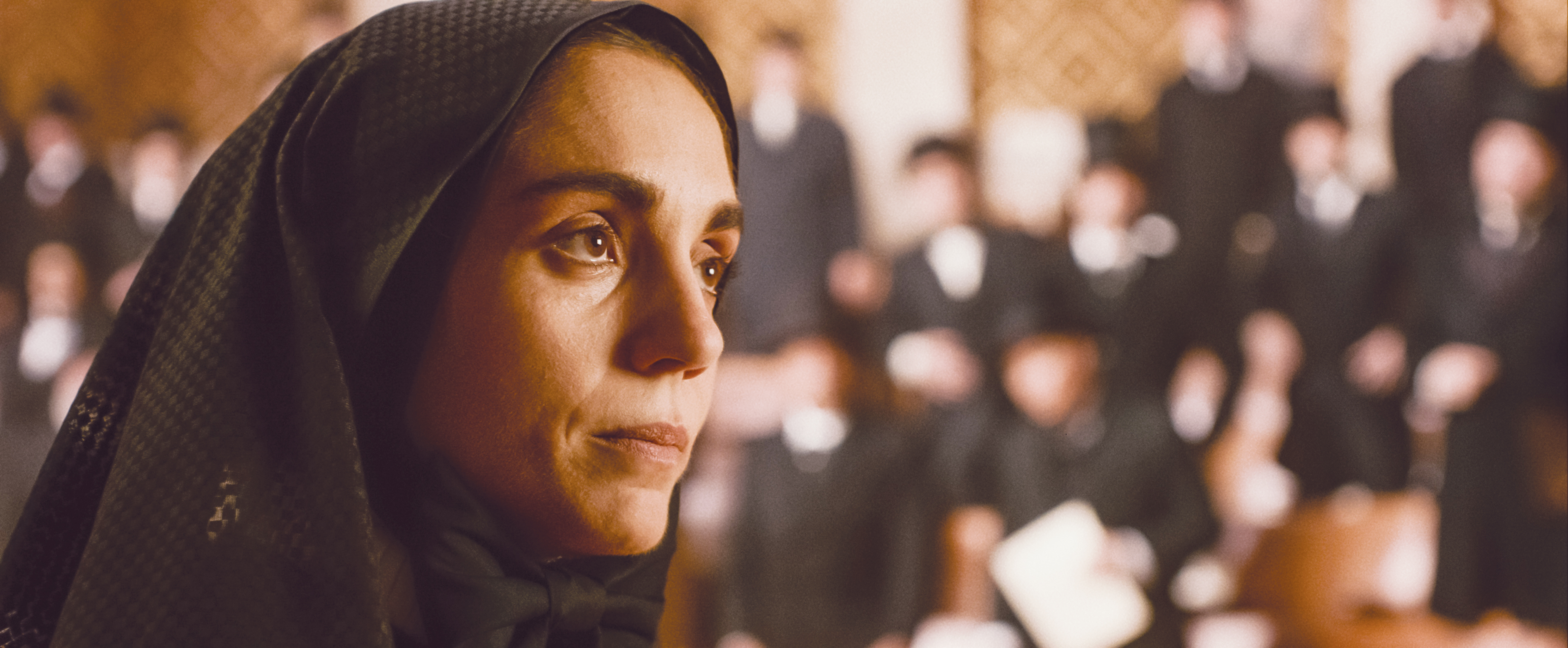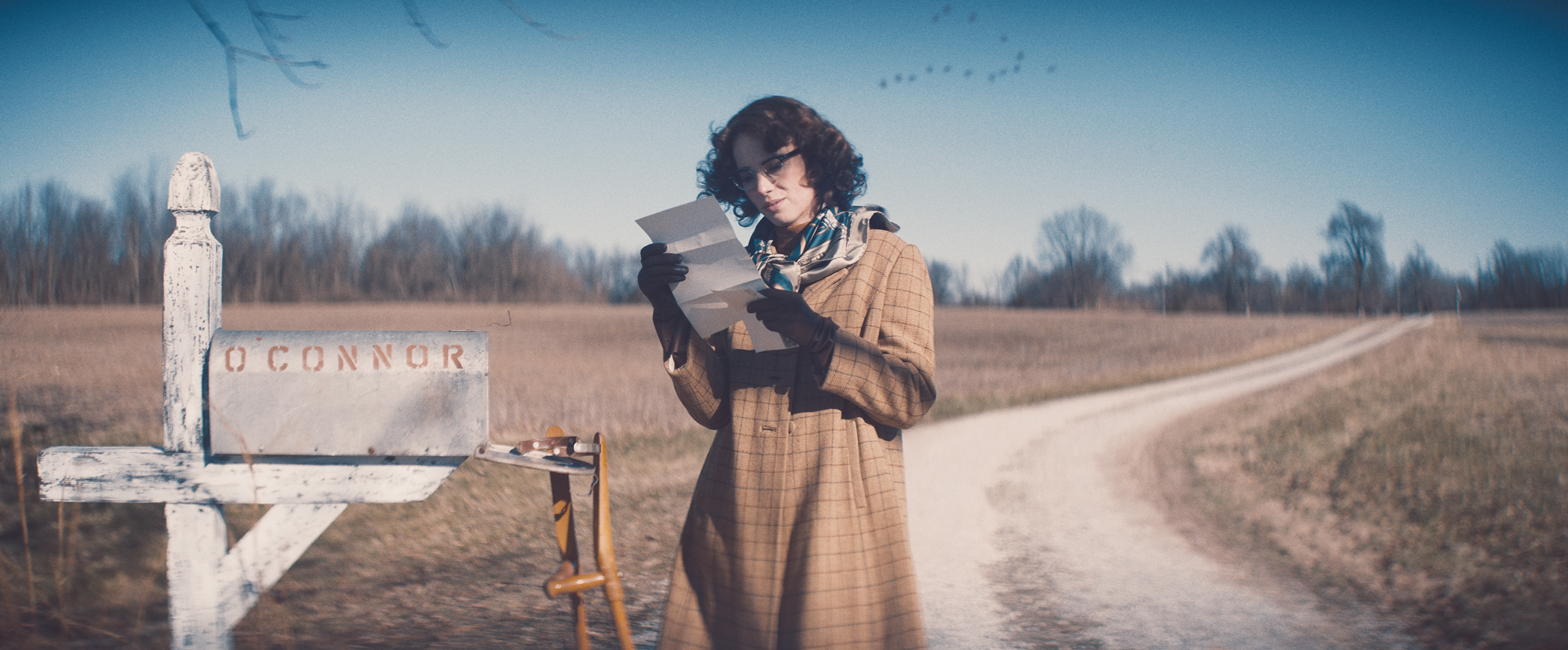Once your eye catches the movement of the Spirit, it cannot be unseen. In recent months, my eyes spotted a peculiarity among leading characters in multiple films. At least three films this year featured a notable Catholic as the lead role. Cabrini opened in theaters in March. This independent film, about the first canonized U.S. citizen, traces Mother Frances Xavier Cabrini's journey from Italy to New York City, where she tangles with the canny mayor and advocates for housing and health care for orphaned and immigrant children. Two months later, Wildcat, about the American Catholic writer Flannery O'Connor, opened in theaters.
Later in May, PBS released Teilhard: Visionary Scientist, streaming for free. This biographic documentary tells the story of French Jesuit scientist, paleontologist and theologian, Pierre Teilhard de Chardin, SJ. After years of exile in China, he eventually came to live in the U.S. and died in New York. In addition to these films in 2024, the final days of 2023 witnessed the release of Freud's Last Session. This film imagines the encounter between the founder of psychoanalysis, Sigmund Freud, and C.S. Lewis, the British writer and theologian, as the two intellectuals debate the existence of God.
I am struck by the visibility of these stories in the so-called secular world. Conventional wisdom would say that it's the Church's role to tell the stories of such notable Catholics through preaching, evangelization or Catholic publishing. Yet the Spirit always finds a way through cracks and crevasses. Ordinary people — whose careers and vocations entail the arts, writing, acting, storytelling and the like — found something deeply compelling in the Catholic intellectual and spiritual lives of these individuals. So much so that they labored for years to tell the story. There is something worth pondering in the three biographic features spotlighting individuals who were Americans or lived in the U.S. Coincidence is too simple of a dismissal.
I conjecture the Spirit is stirring hearts and great creativity among writers, filmmakers and actors alike, just as it has inspired other artists, sculptors, architects and literaries throughout the centuries. Within these films, I see three common threads that connect to our work and ministry in Catholic health care: tensions, love and hope.
TENSIONS
Every good storyline needs a twist. The devout characters in these films received no free pass from life's difficulties, including challenges with their own faith lives. All three experienced tense encounters with superiors
or ecclesial authorities. Founder of the Missionary Sisters of the Sacred Heart of Jesus, Mother Cabrini butted heads with Vatican curia and archbishops. O'Connor faced off with publishers and her parish priest. Teilhard endured the sting of rejection
by the Jesuit Superior General and betrayal by an intellectual peer.
For Teilhard, his intellectual embrace of evolution could not be easily harmonized with centuries of Catholic teaching and the theology of the era. His writings remained suppressed his entire life. After returning to France following years of exile in China, solace still eluded him. He sought refuge in New York, and even there, the Jesuit community viewed him with suspicion. He spent his final years living alone in a small apartment with a single window facing a dark alley.1

Tensions saturate O'Connor's work. A provocateur, O'Connor's writings plunge headlong into Southern society and themes of illness and disability, crime, racism and socioeconomic disparities. At times, the most unsavory characters experience a moment of redemption, when more likable characters spiral as they confront their own transgressions and rejection of grace. O'Connor so keenly sees the strangeness of the Christian story and the counterintuitive workings of divine grace alongside the awfully stubborn underpinnings of sin in human nature. All throughout, moviegoers get a taste of the exotic discovered in the spiritual life.
Conversations across Catholic health care scarcely escape the mention of the struggles and headwinds of being a Catholic ministry in the U.S. today. There is tension with policies that inhibit fuller expressions of human flourishing. Tensions abound with payers, private insurers, suppliers and vendors beholden to shareholders and private equity expecting profits on the backs of sick individuals, the chronically ill, senior populations and the dying.2 Tension arises in a society exhibiting declining trust in institutions, compounded by suspicion and misunderstanding of religious traditions.
The tensions we face today are additional verses of the song sung through these films. Mother Cabrini faced strikingly similar obstacles with politicians and businessmen. O'Connor's prose reacts to a society at odds with the reign of God she glimpsed at daily Mass. Teilhard could not overcome the tension between faith and science and the institutional confines during his lifetime.
One of the many beauties of these films is how figures of faith channeled their interior lives. They responded to grace that opened paths and strengthened their vocational call amidst unresolved life tensions. For those of us in Catholic health care, these movies give us clues for letting some tensions remain while we continue with unabashed devotion to enlivening the healing ministry of Jesus in our aching world and society. Just as love impelled these characters, it does so for us as well today.
LOVE
Tensions loosen with love. If tensions drive the storylines of Cabrini, Wildcat and Teilhard, then love overflows all the more.
Mother Cabrini exhibited a genuine love of children, especially immigrant children. She saw in them her own story, one of struggle and searching for a way of life less confounded by prejudice and rejection. The community she founded embraced the children left parentless by illness, disease or the strain of migrating. Her desire to restore hope and a brighter future for these young people motivated her to build housing and hospitals, from New York City to Denver to Chicago, and places in between.
From the first minutes of Teilhard, the viewer sees his immense love of nature. It developed into a deep devotion to science, and especially to evolution, not merely to the physical world but to the spiritual life as well.3 Simultaneously, he had a genuine love for his priestly vocation. Days before his ordination, he writes about his sincere conviction of the veracity of evolution despite the grave suspicion cast upon it by official Church teaching. This love for his priestly ministry endured years later when confronted with the proposition of leaving. Love alone could hold the strong contradictions Teilhard experienced.
O'Connor expressed a love of the Mass. She also loved birds and tended an aviary on her farm, including peacocks. Most of all, O'Connor loved to write.
Wildcat captures adaptations of some of O'Connor's most exquisite lines. In one scene in the film, her character says, "Dear God … Let me be your typewriter." The prayer expresses her love, and yet when asked about writing, she dryly replies in the movie, "It's like giving birth to a piano, sideways."4 Writers, artists and athletes know the struggle in practicing their art or sport. Discipline and practice that flow from a deeper well of love for the art or activity can temper tensions and lend to accomplishment.
Leaders and sponsors of Catholic health care exhibit great love and devotion to this healing ministry. Expressions of love mark our ministries and appear in our commitments to women, men and children in society's throwaway culture — seniors, those unborn, persons with disabilities, individuals with serious and incurable illnesses, migrants and refugees, and those who experience a lifetime of disparity and disadvantage. The cogs and barbs of bureaucracy, however, snag even greater expressions of our ministry's love.
When we feel exhausted by obstacles and rejection, it can lead us to ponder avenues of abandonment to commitments and forego the difficult path of grace. The fervent love revealed in Mother Cabrini, Teilhard and O'Connor are contemporary witnesses to the scriptural reference that love endures all things (1 Corinthians 13:4-7). For me, these movies normalize the difficulties faced in today's milieu. They temper a reaction to overexaggerate the difficulties of challenges, and they remind me that the work of ministry most often is tenuous, because it ultimately exists by grace.

These grand narratives of O'Connor, Mother Cabrini and Teilhard are important for us in Catholic health care. Robert Ellsberg, editor-in-chief and publisher of Orbis Books, offers an apt explanation: "It makes a difference if we look at stories that elevate our spirits, empower our consciences, and open our hearts to new possibilities of human living. … In reflecting on the stories of saints, I was struck by how often a crucial turning point in their lives came through their encounter with another saint. Sometimes that was a personal encounter, but often it came through reading a story."5
Formation knows the power of story. Perhaps some in Catholic health care might experience a turning point and inspiration through these great American Catholic stories. They have the power to inflame our own narrative and commitment, and good stories like these spark a renewed sense of hope.
HOPE
Mother Cabrini famously inspired her missionary sisters, as her character in the movie declares the need to build "an empire of hope." Her love for immigrants, her community and vocation outweighed the strife she encountered
and could not quench her great hope that came from faith in the resurrection of the dead.
CHA's new strategic plan, building upon our vision "to embrace bold change," echoes a similar message. Catholic health care's bold plans to care for all, reimagine a just and sustainable health system, and stand united for change present a vision of hope. 6 Many attendees of CHA's Assembly in June departed with an unmistakable burst of hope. Similarly, ministry formation programs routinely conclude with hearts and vocations bolstered by great hope.
Such hope, however, cannot be taken for granted. Catholic health care leaders and sponsor members must be the conduits of hope so needed across our ministries. We are called to imitate the enthusiasm of Mother Cabrini, O'Connor and Teilhard in our ministries amidst our communities today. As Pope Francis urges us to do for this Jubilee Year 2025,"[W]e are also called to discover hope in the signs of the times that the Lord gives us. … We need to recognize the immense goodness present in our world … ."7
LOVE PROPELS US FORWARD
The lead characters in Cabrini, Wildcat and Teilhard fostered love that soothed illness, overcame war-torn violence, endured marginalization and exile, healed broken relationships
and ultimately imbued them with hope. These movies just might form us as leaders and sponsors of this healing ministry to boldly advance Catholic health care, propelled by great hope and love.
DARREN M. HENSON, PhD, STL, is senior director of ministry formation at the Catholic Health Association, St. Louis.
NOTES
- Louis M. Savary and Patricia H Berne, Teilhard de Chardin—Seven Stages of Suffering: A Spiritual Path for Transformation (Mahwah, New Jersey: Paulist Press, 2015).
- Healthcare Here, https://healthcarehere.org.
- Ilia Delio, Making All Things New: Catholicity, Cosmology, Consciousness (Maryknoll, New York: Orbis Books, 2015).
- Brad Miner, "Snippets: Ethan Hawke's Biopic about Flannery O'Connor," The Catholic Thing, June 12, 2024, https://www.thecatholicthing.org/2024/06/12/snippets-ethan-hawkes-biopic-about-flannery-oconnor/.
- Robert Ellsberg, "Walking the Path of Holiness: What I've Learned from a Lifetime of Studying Saintly Lives," America: The Jesuit Review, June 29, 2023, https://www.americamagazine.org/faith/2023/06/29/all-saints-robert-ellsberg-245549.
- "The Catholic Health Association Strategic Plan: 2025-2027," Catholic Health Association, https://www.chausa.org/docs/default-source/about/cha-strategic-plan-2025-2027.pdf?sfvrsn=d31d9f2_3.
- Gerard O'Connell, "Hope Is the Central Message of Pope Francis' Decree for Jubilee Year 2025," America: The Jesuit Review, May 9, 2024, https://www.americamagazine.org/faith/2024/05/09/pope-francis-jubiliee-year-2025-247898; Linda Bordoni, "Vatican Announces Motto of Jubilee Year 2025: 'Pilgrims of Hope,'" Vatican News, January 13, 2022, https://www.vaticannews.va/en/vatican-city/news/2022-01/jubilee-year-2025-motto-archbishop-fisichella-new-evangelization.html.
